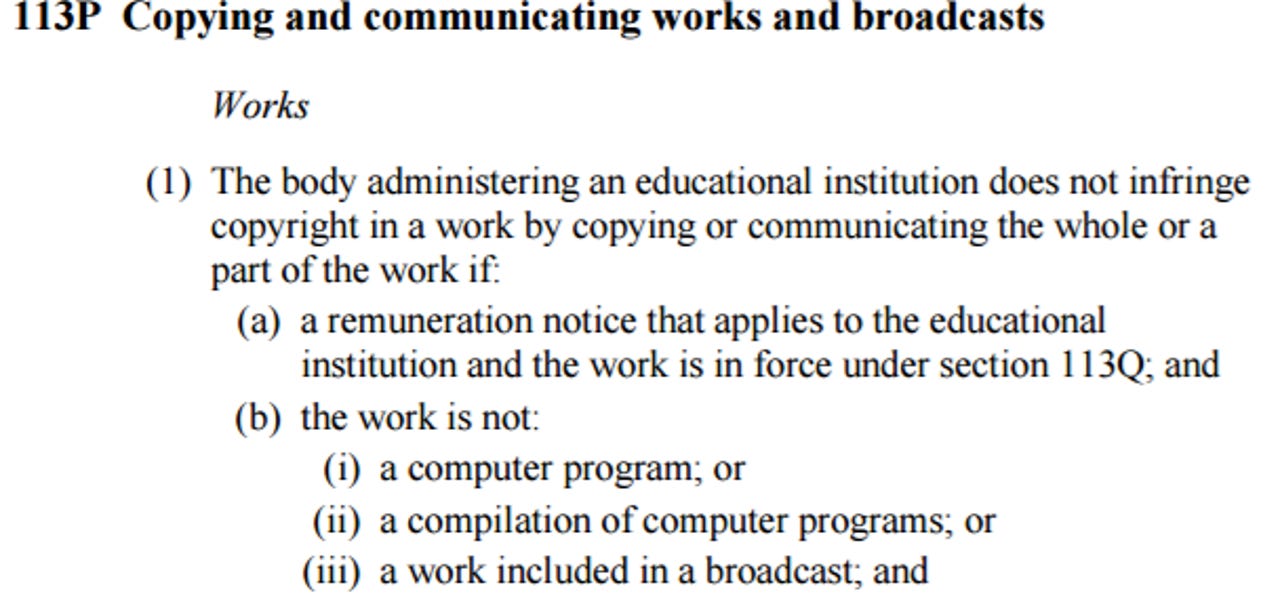Parliament passes digital fair dealing for Copyright Act


The Australian government has passed amendments to the Copyright Act 1968 to provide fair use provisions for access to copyright material by those with a disability, along with protecting educational facilities, key cultural institutions, libraries, and archives from copyright infringement.
The Copyright Amendment (Disability Access and Other Measures) Bill 2017, passed by both Houses of Parliament this week, is an effort to bring "Australia's copyright laws into the digital age", Communications Minister Mitch Fifield said.
"These important reforms include measures which will significantly improve access to copyright materials for people with a vision, hearing, or intellectual disability," Fifield added.
"The legislation will simplify and improve copyright licensing provisions for the nation's collecting societies and educational institutions, and allow educators to use copyright materials more easily in the digital education environment."
Sections 113N-U of the Bill [PDF] protect educational institutions for copying and communicating works and broadcasts on the condition of an agreed upon remuneration.
"An educational institution may copy or communicate certain copyright material for educational purposes if the body administering the educational institution agrees to pay equitable remuneration to a collecting society," the Bill says.
However, such work cannot include a computer program, a compilation of computer programs, or a work included in a broadcast.
Libraries are covered under s113G; archives and libraries for the purpose of preservation under s113H; archives and libraries for the purpose of research under s113J; and archives and libraries for the purpose of administration of a collection under s113K.
The legislation also protects key cultural institutions and their preservation of material under s113L and s113M, with usage of a copyright material not constituting infringement.
Section 113E provides a fair dealing provision for persons with a disability, meaning they can access material without infringing copyright, while s113F extends this to organisations assisting people with a disability.
Electronic Frontiers Australia (EFA) congratulated the government on removing "absurd restrictions" against libraries, galleries, and museums, but added that it should have taken the opportunity to extend the safe harbour regime beyond internet service providers.
"Extending the copyright safe harbour scheme will provide legal certainty for all Australian organisations that provide online services, from schools and universities to technology startups and service platforms, while delivering low-cost mechanisms for rights holders to request for infringing content to be removed, and ensuring that Australian consumers will have recourse against frivolous and erroneous take-down requests," EFA said.
"The Copyright Amendment (Disability Access and Other Measures) Bill therefore provides important but only incremental steps towards a copyright system that is fit for purpose in the digital age. What is now required is the introduction of a broad, flexible fair use exception into Australia's Copyright Act."
The government in April announced that it is consulting on a safe harbour extension beyond ISPs to all online service providers including cloud computing services, search engines, and online bulletin boards.
The provision would protect these online service providers from legal liability for any copyright infringement taking place via the services they provide -- as long as they take "reasonable steps" to remove copyright-infringing material, Fifield said at the time.
This week's announcement followed the Productivity Commission last year recommending that Australia apply the safe harbour provision to all online service providers.
The passage of the amendments came more than a year and a half after the government published an exposure draft providing exceptions for educational and cultural institutions, as well as for those with disabilities back in December 2015.
The former Labor government had initially called for a review of the Copyright Act five years ago to consider whether it had been outdated by changes in digital technology, and whether it should consequently be updated.
This was followed soon after by the Australian Law Reform Commission (ALRC) submitting a report to the government on the matter. However, in December 2013, Australian Attorney-General George Brandis indicated the government's intention to put the report on the backburner until 2014.
In February 2014, the ALRC's report, titled Copyright and the Digital Economy, was finally tabled in Parliament, setting out various provisions to be added to the amended legislation.
The ALRC had argued that similar to the laws in the United States, a "fair use" exception when a person is accused of copyright infringement should be outlined within the revamped Copyright Act.
Research for the purposes of news reporting, review, criticism, satire, parody, quotation, non-commercial private use, professional advice, and incidental or technical use were also recommended by the ALRC to be exempted from prosecution for copyright infringement, but were not included in the amendment.
The technology sector would in particular have benefited from the addition of the non-commercial private use and technical use exemptions, as they would cover data caches, cloud computing, digital recording, and transferring of content.